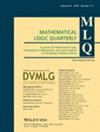WKL$\mathsf{WKL}下实值连续函数的编码$
IF 0.4
4区 数学
Q4 LOGIC
引用次数: 0
摘要
在构造逆数学的背景下,我们证明了弱König引理(WKL$\mathsf{WKL}$)暗示了每个逐点连续函数f:[0,1]→ R$f:[0,1]\rightarrow\mathbb{R}$是由逆向数学意义上的代码引起的。结合WKL$\mathsf{WKL}$隐含范定理的事实,表明WKL$\mathsf{WKL}$隐含一致连续性定理:每个逐点连续函数f:[0,1]→ R$f:[0,1]\rightarrow\mathbb{R}$具有一致连续模。我们的结果是在Heyting算法中得到的,在所有有限类型中都有无量词选择公理。本文章由计算机程序翻译,如有差异,请以英文原文为准。
Coding of real-valued continuous functions under
WKL
$\mathsf {WKL}$
In the context of constructive reverse mathematics, we show that weak Kőnig's lemma () implies that every pointwise continuous function is induced by a code in the sense of reverse mathematics. This, combined with the fact that implies the Fan theorem, shows that implies the uniform continuity theorem: every pointwise continuous function has a modulus of uniform continuity. Our results are obtained in Heyting arithmetic in all finite types with quantifier-free axiom of choice.
求助全文
通过发布文献求助,成功后即可免费获取论文全文。
去求助
来源期刊
CiteScore
0.60
自引率
0.00%
发文量
49
审稿时长
>12 weeks
期刊介绍:
Mathematical Logic Quarterly publishes original contributions on mathematical logic and foundations of mathematics and related areas, such as general logic, model theory, recursion theory, set theory, proof theory and constructive mathematics, algebraic logic, nonstandard models, and logical aspects of theoretical computer science.

 求助内容:
求助内容: 应助结果提醒方式:
应助结果提醒方式:


